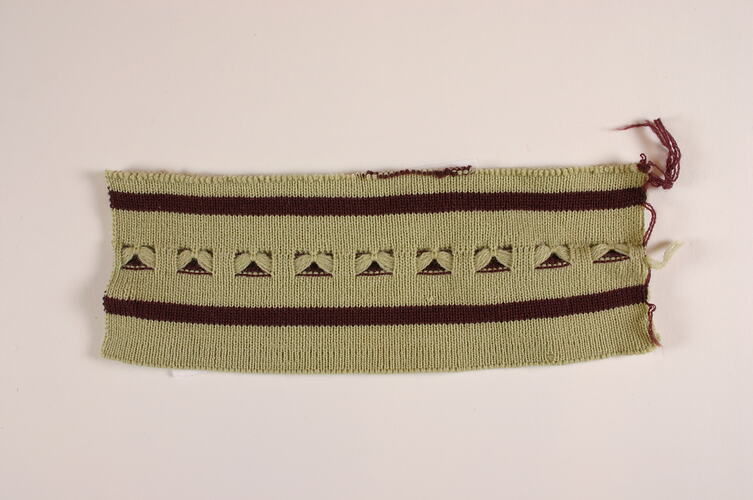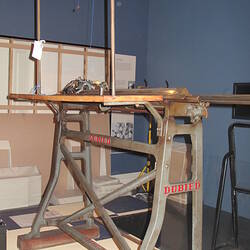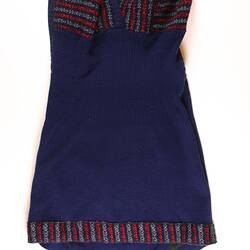Summary
Pale Green Knitting sample, one of many made by Edda Azzola to test designs prior to making a garment. Edda Azzola, nee Pugnetti, was born in 1927 in Moggio Udinese in the Friuli region, northern Italy and the family moved to nearby Pontebba four years later. In Italy Edda and her two sisters worked as knitting machinists from the family home. Edda married Angelo Azzola, a young man from her village and they migrated to Australia in the mid 1950s.
In 1958 Edda purchased a knitting machine from an Italian girl who couldn't afford to take back to Italy. She then made contact with a factory owner, Mr Richard (Ricardo), whose knitting factory was in Collingwood. He supplied the wool to produce clothes which were supplied to stores such as Georges, Myer and David Jones. Edda worked for Richard until the factory closed in 1974, working on the machine and finishing by hand. She worked 5-6 hours a day, depending on demand and deadlines and the work suited her as it allowed her the flexibility of working from home, and organizing her labour to suit her domestic needs. After 1974, Edda used the machine to make clothing for family and friends, including baby clothes for her grandchildren.
Physical Description
Small knitting sample. Pale green with brown stripe and a bow pattern.
Significance
The Edda Azzola knitting machine collection enables the exploration of issues relating to post World War II migration experiences, outworker working life, the post-war inner city Melbourne textile industry and dowry production. The collection, which includes a domestic knitting machine, tools, materials, textile samples, garments, a design notebook, photographs, an oral history interview, operator demonstration video and hand made glory box items, all combine to create a rich snapshot of working and migrant life, particularly significant with the large numbers of migrant women who were employed in and for textile factories around the city. This story and collection is also enriched by its close connection to the Richard Charlupksi story, for whom Edda worked and which explores the 1950s-1970s wool fashion industry.
More Information
-
Collecting Areas
-
Acquisition Information
Donation from Mrs Edda Azzola, 17 Dec 2007
-
Maker
Mrs Edda Azzola, Reservoir, Greater Melbourne, Victoria, Australia, circa 1960s
-
Manufactured For
Ricardo Knitwear, Collingwood, Greater Melbourne, Victoria, Australia, circa 1960s
-
Classification
-
Category
-
Discipline
-
Type of item
-
Object Measurements
195 mm (Width), 71 mm (Height)
-
Keywords
Clothing Trade, Immigration, Italian Communities, Italian Immigration, Textile Industry


